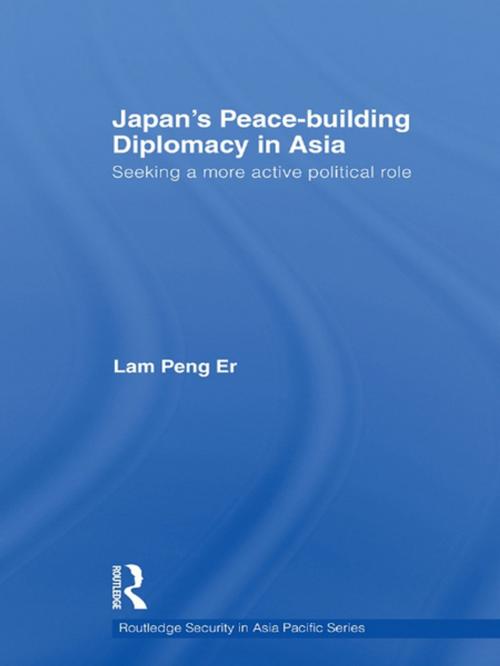Japan's Peace-Building Diplomacy in Asia
Seeking a More Active Political Role
Nonfiction, Social & Cultural Studies, Social Science, Cultural Studies, Ethnic Studies, Political Science, International, International Relations| Author: | Peng Er Lam | ISBN: | 9781134125050 |
| Publisher: | Taylor and Francis | Publication: | June 2, 2009 |
| Imprint: | Routledge | Language: | English |
| Author: | Peng Er Lam |
| ISBN: | 9781134125050 |
| Publisher: | Taylor and Francis |
| Publication: | June 2, 2009 |
| Imprint: | Routledge |
| Language: | English |
The conventional portrayal of Japan’s role in international affairs is of a passive political player which – despite its position as the world’s second largest economic power – punches below its weight on the world stage: its foreign policy driven by Washington, mercantilism and constrained by domestic pacifism. This book examines Japan’s emerging identity as an important participant in conflict prevention and peace-building in Southeast and South Asia, demonstrating that Japan has increasingly sought a positive and active political role commensurate with its economic pre-eminence. The book considers Japanese involvement in many of the region’s most serious recent conflicts: including Japan’s part in the brokering and maintaining of peace in Cambodia, which in 1992 saw the first dispatch of troops abroad by Tokyo since the end of World War II, and the attempts to bring peace to Aceh, Sri Lanka, East Timor and Mindanao. The Japanese example, when compared with other countries prominent in the fields of conflict prevention, suggests that Tokyo – given its pacifist strategic culture – relies on diplomacy and Official Development Assistance rather than peace enforcement through military means. Overall, this book provides a lucid appraisal of Japan’s overall foreign policy, as well as its new role in conflict prevention and peace-building - analysing the reasons behind this shift towards an active international role and assessing the degree of success it has enjoyed.
The conventional portrayal of Japan’s role in international affairs is of a passive political player which – despite its position as the world’s second largest economic power – punches below its weight on the world stage: its foreign policy driven by Washington, mercantilism and constrained by domestic pacifism. This book examines Japan’s emerging identity as an important participant in conflict prevention and peace-building in Southeast and South Asia, demonstrating that Japan has increasingly sought a positive and active political role commensurate with its economic pre-eminence. The book considers Japanese involvement in many of the region’s most serious recent conflicts: including Japan’s part in the brokering and maintaining of peace in Cambodia, which in 1992 saw the first dispatch of troops abroad by Tokyo since the end of World War II, and the attempts to bring peace to Aceh, Sri Lanka, East Timor and Mindanao. The Japanese example, when compared with other countries prominent in the fields of conflict prevention, suggests that Tokyo – given its pacifist strategic culture – relies on diplomacy and Official Development Assistance rather than peace enforcement through military means. Overall, this book provides a lucid appraisal of Japan’s overall foreign policy, as well as its new role in conflict prevention and peace-building - analysing the reasons behind this shift towards an active international role and assessing the degree of success it has enjoyed.















